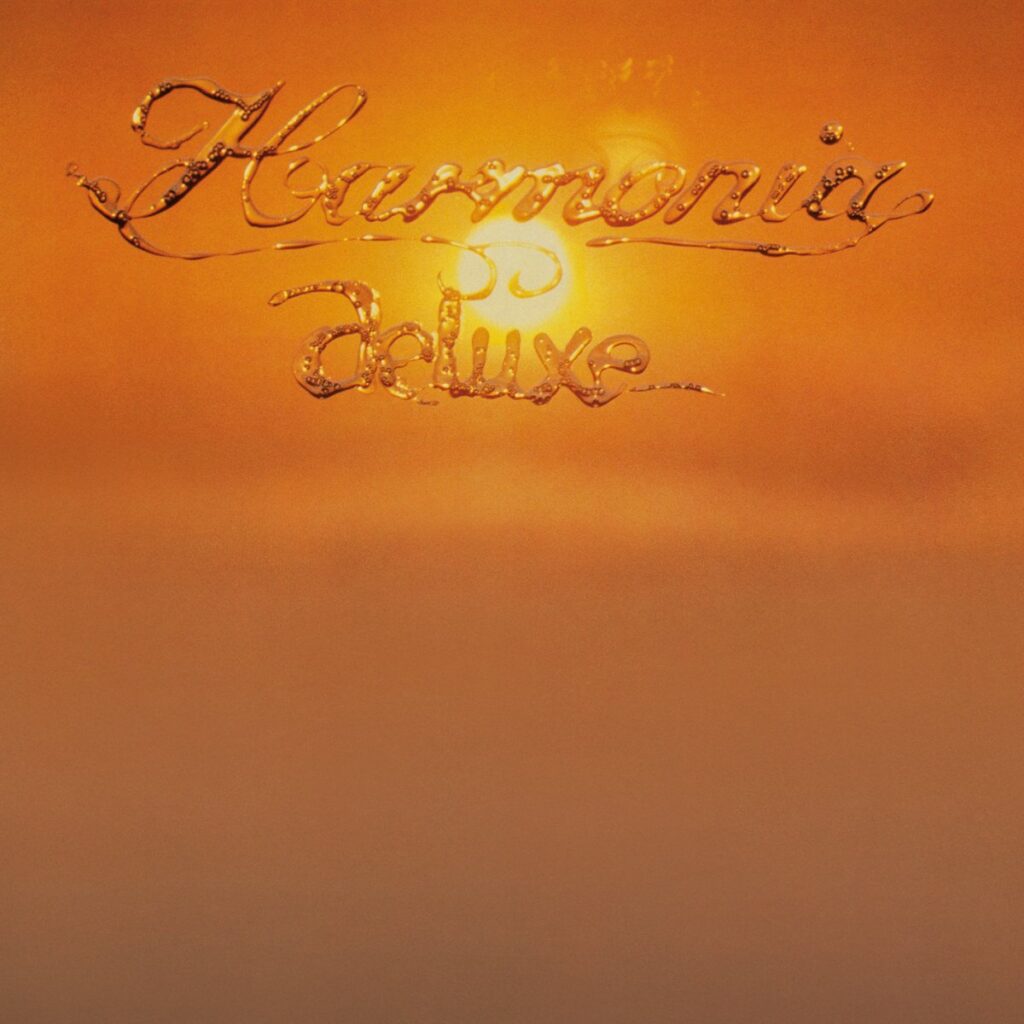By 1975, the ornery optimism of the early 70s had declined into a laid-back complacency, with the period’s political stasis paralleled by the mainstream hegemony of unchallenging soft rock. In response, Harmonia’s second album, Deluxe represents a defiant continuation of countercultural impulses – experimentalism, improvisation, communality – while prefiguring the unease and dissatisfaction soon to be exemplified by punk. Consequently, Deluxe executes a constant pull and push between placidity and urgency, tranquility and anxiety, calm and agitation that is the very sound of the faultline running through the mid-70s. “Mal lecht, mal schwer” (“Sometimes easy, sometimes hard”) as they put it on ‘Monza (Rauf Und Runter)’.
Despite recording in a rural commune in the tiny village ofForst, Lower Saxony, Dieter Moebius and Hans-Joachim Roedelius’ early work as Cluster had little of the meditational serenity of more kosmische contemporaries Popol Vuh or mid-70s Tangerine Dream. Cluster’s 70s music is characterised instead by uneasy drones, bristling textures and rickety rhythms. Testament to the 70s’ communal ethos, a collaboration with Neu! guitarist Michael Rother resulted in 1973’s Musik Von Harmonia and 1974’s Rother-produced Cluster LP Zuckerzeit, whose warpedly poppy cartoon themes were as ‘ambient’ as a (friendly) poke in the ribs.
Following Neu! 75, Rother brought that album’s proto punk vocals and drum-driven urgency back to Forst, further abetted by producer Conny Plank inviting Guru Guru drummer Mani Neumeier to the sessions. While this is the closest to a ‘band’ that any of the musicians’ projects sounded, Neumeier’s playing provides as much atmosphere as motor, and indeed, throughout Deluxe standard rock dynamics are deliberately – and satisfyingly – subverted.
Barely credibly, Deluxe is less esteemed than Harmonia’s fine but tentative debut: Moebius and Roedelius regarded it as more of a Rother album, while critics rated it relatively conventional. In his otherwise definitive Krautrock study, Future Days, David Stubbs called it “a little too light”. Yet how is incorporating rock dynamics into avant techniques less adventurous than holing up in an esoteric comfort zone? It’s why the folk puritans were wrong about Dylan going electric and why post punk was more creative than punk: combining pop and non-pop forms is far more radical than upholding their polarity. So Deluxe sits at the midpoint of the avant-meets-rock continuum begun by psychedelia, progressed by prog and completed by post punk, which is absolutely smeared with Harmonia’s fingerpints.
The album’s two vocal tracks prefigure the attitudinous punk thrash of the Sex Pistols, but awash with atmospherics, are actually far closer to Public Image’s post punk. ‘Deluxe (Immer Wieder)’ begins with buzzing, twittering synths and Roedelius organ motif of such gorgeous grandiosity that it rivals Kraftwerk (months before Radioactivity). This is underlain by Rother’s octave bass and a characteristically wonky Cluster drum-machine, which, rattling away on ‘Latin’ setting, suggests drive but, without a defined backbeat, glides rather than taking off. Equally, the vocals suggest a song while resisting song-structure, and rather than being ‘self-expression’, the track’s massed, messy sprechgesang is a sloppier take on ‘Autobahn’s shredded Beach Boys. Harmonia sound like they’re having a lot more “fahr’n’ fahr’n fahr’n” than deadpan Kraftwerk, but with attitude rather than oil to burn. While mocking West Coast complacency, the effect is less anti-American than counter-American, however. The vocals’ cheery ungainliness works in dialogue with the mysterious stateliness of Roedelius’ organ and eeriness of Moebius’ whistling, buzzing synths, which dominate the track’s middle section. Rother’s guitar is first foregrounded a full five and a half minutes in, and even then it’s fragmented, its incomplete patterns eschewing the circular certainty of rock riffing, open-ended rather than tentative: the sound of possibility.
This fragmented guitar style is something post punk would run with – from Wire to The Cure to the Banshees – while the tune’s last section’s emphasis on Rother’s trebly, melodic bass must have been as influential on Joy Division as Lemmy’s work with Hawkwind – a band best understood as British krautrock. Finally, after a return of that opening anti-West Coast chant, guitar and organ unite on the opening riff, bringing the piece to such a graceful close it occludes how contradictory it has been. Punky yet plangent, snotty but stately, assertive yet receptive, ‘Deluxe (Immer Wieder)’ captures the competing currents of its contemporary moment. “Einmal draft und einmal drunter” (sometimes on top, sometimes under), as Harmonia put it.
‘Monza (Rauf und Runter)’ is punkier still, but perpetuating Deluxe’s dialectic, begins ambiently with airy guitar feedback, bubbling-water synths and electric piano eddies. This pastoral calm is abruptly curtailed by a jagged shard of guitar from Rother, Neumeier’s beautifully messy motorik and a ricochet of warning shouts, eerily preminiscent of John Lydon’s “hello, hello” on ‘Public Image’. Then we’re into another, even sloppier, melody-free chant but with exactly the same lyrics as ‘Deluxe (Immer Wieder)’. This time Harmonia don’t even try to disguise their laughter, the chuckling both charming and disconcerting. But for all its punky attitude, ‘Monza’ sounds like engagement rather than alienation: “Müssen zusammen singen” (“We must sing together”) they chortle convivially at the start. Like ‘Deluxe (Immer Wieder)’, ‘Monza’ features a trebly Rother bass-part, while, on guitar, Rother mostly sticks to one note, drenched in feedback, never becoming a riff, let alone a solo. While Moebius takes the mick with comic synth effects, this doesn’t dent the music’s majesty. Harmonia embrace complexity, hence possibility, their experimentalism expressing countercultural optimism rather than punk’s reactionary pessimism. As such Harmonia’s shout of “hallo hallo!” on the fade sounds like an attempt to connect. Unlike PIL’s sneering dismissal of society, it expresses – and in its collective vocals exemplifies – a continuing faith in human cooperation.
Between these vocal tracks comes ‘Walky Talky’, a cinch for any krautrock top five. Neumeier’s real-kit version of ‘Deluxe (Immer Wieder)’s latin groove sometimes lollops lazily, sometimes pushes urgently at the rhythm’s parameters, intertwining with Rother’s pulsating one-note bass. Over this fluctuating bedrock, Rother unleashes cascades of spectral, thinned-out guitar, while Moebius interjects cartoony whooshes and synth-parps. Rother’s gently thrummed power-chord at 2:57, sounds like an intention, pregnant with possibility, but instead fades into sonic space, within which Roedelius’s meandering synth never quite forms a melody. When Rother’s ‘thrum’ returns (at 4:25), it now sounds like a warning, an alarm, with Moebius’s synth-swooshes taking a darker turn and Neumeier’s drum-fills sounding like he’s afraid to leave a space. But then the track just hovers, defying the listener’s expectation of development (or destination). So by the time Rother’s ‘thrum’ returns again at 7:32, it sounds like an ‘all clear’: anxiety has dissipated and the track glides calmly and gracefully to a close. Over its seven minutes, ‘Walky Talky’ first reflects, then rejects the anxiety an alienated society lends to any activity – or inactivity – beyond regulated, structured labour.
While this opening trio is amongst the best half-hours of music on any album, the three quieter tracks that conclude Deluxe are no less compelling. Rather than departing from the album’s narrative of a competing urgency and placidity, they complete it. ‘Notre Dame’ surges up on Roedelius’s agitated organ curlicue, half-propelled, half contained by the wobbly drum machine. Momentum is lost within a minute, however, leaving the track drifting between calm and uncertainty (the sense of space serene, the synths bubbling restlessly). But when the organ riff returns, underlain by Neumeier’s rubbery four-to-the-floor, its purposefulness paradoxically calms the anxiety. ‘Golum’ rides in on an uncharacteristically metronomic synth-riff, backed by Neumeier’s toms, so beautifully tuned you could lose yourself in their soundworld. Again, within a minute the synth-riff has faltered, Roedelius’s warmly spectral electric piano and Moebius’ quirkily eerie filigrees becoming entirely textural rather than purposeful. Then momentum builds again, pushed by Neumeier’s slackly assertive toms, the synth riff returning in fractured form, like a sample of itself, is then fully reasserted, and then the whole track immediately fades.
These quieter tracks maintain the pattern of their louder counterparts. Each track establishes an agitated forward-motion that first falters, then luxuriates in unstructured open-endedness, at which point anxiety intrudes into this unaccustomed space, before calm is reasserted at the close. As such, Deluxe distils the mid-70s, when foundering social democracy ceased to satisfy its citizenry and structures that had previously provided security – full employment; jobs for life – became stultifying. From this stasis arose a plethora of alternative ways of living and working – squats and communes, co-ops and collectives, even the three day weeks of 1974 – which now seem like relics of some lost utopian civilisation. Establishment repression of such possibilities produced the revolt of punk and the huge strike-wave in the late 70s, before Thatcher’s counter-revolution reasserted work over leisure, privacy over sociality, and the present over the future – as America over Europe. All these would trickle down into popular music by the early 80s.
So, the fact that this most European, future-orientated and convivial of mid-70s albums concludes with its most ambient track isn’t coincidental. The conviviality has retracted now – ‘Kekse’ is just Moebius and Roedelius – but there’s continuity in the rhythmic push of the synths, both peaceful and purposeful. Again, in the familiar pattern, this push loses momentum, as synthetic bird-caws and frog belches fill the sound spectrum in a pastoral exemplification of calm that’s almost kosmische. The rhythm, however, continues at a distance, alongside a muted drum machine, suggesting that calm doesn’t have to mean ‘becalmed’, and serenity isn’t the same as stasis. The plangency of the closing organic piano line confirms this sense of active leisure, as the frogs and birds and bubbling water fill the speakers and the senses. This isn’t ambience as acquiescence, resignation in the face of reaction, but a reassertion of mid-70s longings for unalienated existence.
With Cluster drifting further down this ambient path, Neu! imploding, Faust folding, Can shifting to conventional rock and Tangerine Dream to soporific mush, Deluxe is essentially the last gasp of classic krautrock, its apotheosis. It was left to British musicians to carry its impulses forwards, bringing a new European sensibility into popular music. Bowie’s collaborator on the Berlin trilogy, Eno, came straight from Forst to 1976’s Low sessions (‘Art Decade’ is pure Cluster), Rother was supposed to play on 1977’s “Heroes” (clearly indebted to Neu!/Harmonia) and while Bowie called Lodger’s ‘Red Sails’ “Neu!”, its deranged chanting is closer to Harmonia. Of the post punk bands that followed in Bowie and Eno’s wake, Wire would be unthinkable without Harmonia’s deconstruction of rock dynamics, while Siouxsie and the Banshees’ extraordinary ‘Jigsaw Feeling’ on 1978’s The Scream runs on the tom-heavy motorik and jagged, ‘incomplete’ riffs which characterise Deluxe. Ultravox’s Plank-produced Systems Of Romance the same year aims for Deluxe’s anxious majesty, while 1980’s Vienna would be the peak of Britain’s European turn (alongside Kraftwerk’s ‘The Model’ hitting UK number one), before American hegemony was reasserted in pop, as in politics. Simple Minds’ 1981 ‘This Earth That You Walk Upon’ (from Sons and Fascination) is son of ‘Deluxe (Immer Wieder)’, while ‘Caveman Head’ on the Eurythmics’ Plank-produced In The Garden that year is similarly Deluxe-derived. Despite Deluxe prefiguring so much punk and post punk, however, those genres contained little of Harmonia’s utopianism. So, Deluxe is the sound of the forgotten social and political possibilities of the mid-70s, simultaneously mesmerising and energising, experimental and immediate, thoughtful and visceral.



